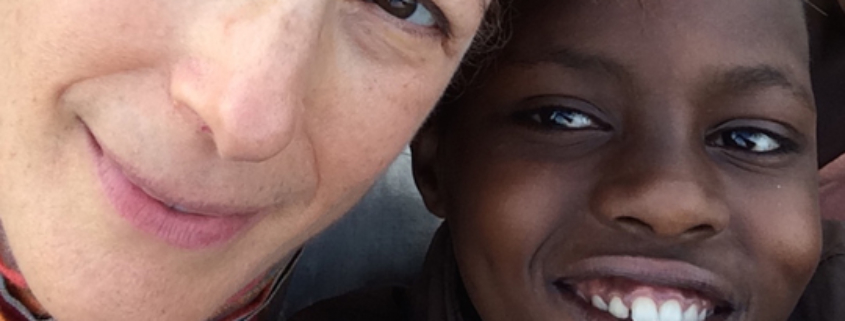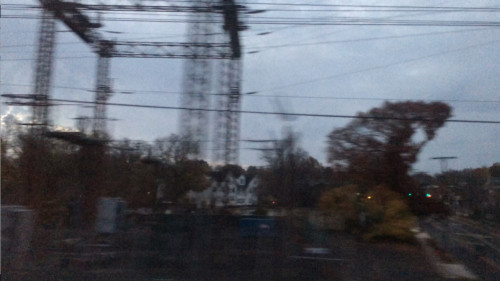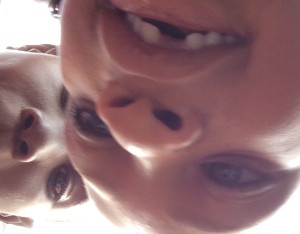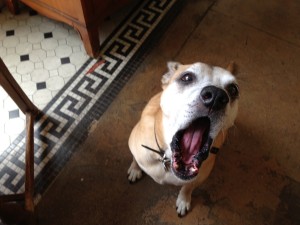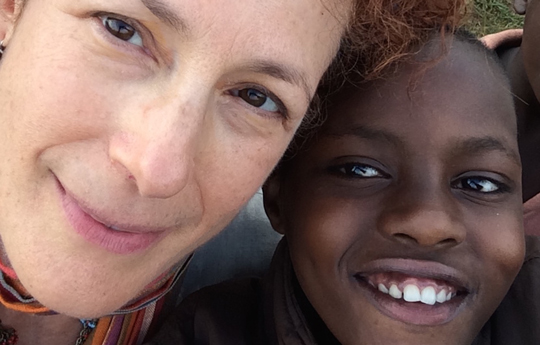Slowing Down #5 – Digging Deep
I’m on the six-o-five Palmetto train from Penn Station to Union Station, Washington, DC, all set up with coffee in the dining car, tip-tapping on my laptop. I’m on my way to DC to participate in a couple of panel discussions after back-to-back performances of a new play about Rwanda, where a million people lost their lives in the hundred days of the 1994 genocide against the Tutsi.
I’m writing-thinking about my time in Rwanda where I was one of the creative directors for the twentieth commemoration of that genocide. The guy across the table from me—tall, bearded, campsite-hip in an olive green parka and cap—is banging away on his laptop, too, and at the same time, he’s on the phone talking to someone (I can’t tell exactly who) about the contractor who’s doing the patio behind his house. And all of a sudden I hear him say the word genocide. And that doesn’t happen all that often in public places, ordinary encounters. So I wait for him to get off the phone and we’re nearly at Union Station, and I say, as we’re packing up our mobile offices, Did you say genocide?
He says, Yes, I did say genocide. He’s an editor for an international news service, has been for many years, so he has covered—as an editor, not a writer, because he is adamant he is not a writer—Sudan and Kosovo and, currently, Syria and Central African Republic and Yemen and Nigeria and countless known, intractable conflicts and mass atrocities all over the world. His writers covered events I worked on in Rwanda, he says, but he doesn’t travel. He stays at home. He’s building a patio.
He asks me how I define genocide, which is a rather intellectual and inside-political conversation people have in the genocide industry. I say what I always say: the definition in the United Nations Convention is pretty specific. He wants to talk about how the g-word gets bandied about for political gain, and I say, nonetheless, the UN is pretty specific: mass targeted murder or calculated efforts to make it impossible for a specific group to live and prosper. Because when people indulge in the kind of discourse he’s inviting, it becomes an obstacle to simply saying, when we see killings start—or know people are planning to kill—we need to be able to stop them. We can discuss why they want to kill later. I say that, just like that, and he nods.
He asks what brings me to this realm and I tell him I was in the Middle East during the Intifada, wound up working for ten months on the twentieth commemoration of Rwanda, and came away with what I now believe might be a touch of PTSD.
Yeah, he says, you got to keep that stuff at arm’s length.
And I think, well, he can do that. He’s an editor; he doesn’t write. He doesn’t travel; he doesn’t dig in. It never occurred to me that keeping this stuff at arm’s length was an option, but if you have a choice, arm’s length might be exactly the thing to do.
* * *
Because shit happens
and it knocks you over
boom boom boom:
You move to a new city
There’s a breakup (a biggie)
There’s the death of a parent after sickness for years
You’re two years in the Middle East, mid-Intifada
Things blow up
You come back to the States
You meet and marry
You buy a home
The economy tanks
You’re way underwater
Other parent gets sick and too-soon dies
Black mold invades your bathroom
My LA job gets mean
I get a new job in Rwanda
I immerse myself, open my heart to what happened in Rwanda twenty-odd years ago. But twenty years is the emotional equivalent of five minutes, and, in my line of work, the present is still defined by the bad shit that hacked more than people to pieces. Trust is the first thing that gets smashed in the wake of a genocide, especially there, where neighbor turned against neighbor and could easily turn again. And now do-gooder muzungu (white people) come from afar, saying they want to help.
Where were you, muzungu, in 1994, when all hell broke loose and no one came?
You sat watching us die on TV.
And I learn first-hand about the cruelty of those who have been cruelly treated.
* * *
I refer to the awful stuff with which I am “invited” to interact—Intifada; Holocaust; familial pathology; genocide in Rwanda—as catastrophic. Shoah, the Hebrew word for the Holocaust, literally means catastrophe, as does Nakba, the Arabic word for what happened to the Palestinians when the Jewish state was founded.
The physiological effect of those catastrophic events is trauma, and trauma is cumulative. It builds up, and it creates us. The way someone might threaten to carve someone else a new asshole, trauma fashions us a new nervous system, right on the surface: we no longer have skin.
This is what I have been thinking about, writing about, for the year and a half since I got back from the lush and terrible and glorious land of Rwanda.
I’m a theatre artist, a writer-performer. I wrote a play about my Russian great-grandfather who abandoned the family, which led to a commission to write my next play in the Middle East, which led to a play about the Holocaust, which led to my being asked to go to Rwanda. Because people think I know how to find my way into rough stuff and tell compelling stories. Insider-outsider, that’s who I am.
I take pride in the following response to a script I wrote, from a Rwandese writer who graciously helped me understand what it was to live through the killing times there: Ce que tu as écrit est si touchant, si précis et si juste qu’on comprend bien que tu le vis de l’intérieur. “What you wrote is so moving, so precise and so true, that it is clear you see our situation from the inside.”
But on that six-o-five train last week—fighting a miserable cold with four hours’ sleep and looking ahead to a day watching and responding to both matinée and evening performances of a play about one of the most god-awful events in human history—I think, maybe this guy in the parka is right: arm’s length would be an excellent way to go.
* * *
I’ve had lots of therapy: talk therapy; bashing-pillows-with-a-foam-bat therapy; wiggling on the floor like a serpent to liberate primordial rage. Yoga. Deep breathing. Baths. Long walks. I got a dog.
I could get myself a job somewhere idyllic, untouched, but if there’s trouble there, I’ll find it.
What works for me—in the realm of addressing personal or global distress—is writing. Writing entails wrestling meaning from the senseless, the unspeakable, which, sadly, wriggling like a serpent does not do. Meaning is story, and it will set us free.
I screw whatever courage I can muster to the possibility that what gets made—what I make—might be of use, might unlock empathy in an audience or a reader; that it might foster engagement with rough narratives, with which it is deeply difficult to engage. Because engagement begets awareness; awareness leads to agency, the sense we might be able to take action.
And all of this counters the impotence we feel in the face of things over which we think we have no control. And if we are engaged and aware, we may find we have more control than we think.
Can I do this in a parka on a patio, at arm’s length?
Can I get up close—dig deep—and not get burned?
Stacie Chaiken is a Los Angeles-based writer-performer. A Fulbright Senior Specialist in the field of Performance and Story, she facilitates What’s the Story? a Los Angeles-based studio for writers and performers who are wrestling with personal story. Her play “The Dig” will premiere at Los Angeles Theatre Center in the spring of 2016. She is currently studying creative nonfiction in the Antioch MFA Creative Writing program.

